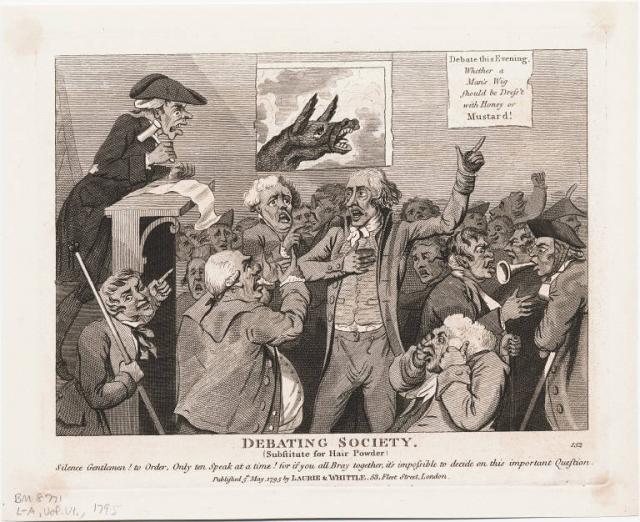Search
Recent comments
- bloody op.....
56 min 26 sec ago - avoiding biffo....
6 hours 48 min ago - leak....
8 hours 52 min ago - trump's women....
13 hours 8 min ago - CIA control....
13 hours 18 min ago - attritioning....
13 hours 29 min ago - hypocrite....
14 hours 45 min ago - not mentioned....
1 day 52 min ago - wonder why....
1 day 3 hours ago - midterms....
1 day 4 hours ago
Democracy Links
Member's Off-site Blogs
when the mad men ruleth and decreed a hairy new tax... with a discount for more than two daughters...

The Duty on Hair Powder Act 1795 (35 Geo. III, c. 49) was an Act of the Parliament of Great Britain levying a tax on hair powder. It was repealed in 1869.
The Act stated that everyone wishing to use hair powder must, from 5 May 1795, visit a stamp office to enter their name and pay for an annual certificate costing one guinea. Certain exemptions were included: the Royal Family and their servants, clergymen with an income of under £100 a year, subalterns, non-commissioned officers, privates in the army, artillery, militia, mariners, engineers, fencibles, officers in the navy below commander, yeomanry, and volunteers. A father with more than two unmarried daughters might buy two certificates which would be valid for any number he stated at the stamp office. The master of a household might buy a certificate for a member of his servants which would also be valid for their successors within that year. The use of hair powder had been declining and the tax hastened its near death. In 1812 46,684 people still paid the tax, in 1855 only 997 did, and almost all of these were servants. By the time it was repealed in 1869 it yielded an annual revenue of £1,000.[1]
The Hair Powder Certificates, etc. Act 1795 (35 Geo. III, c. 112) was passed later in the same session of Parliament to allow people more time to apply for certificates.[2]
https://en.wikipedia.org/wiki/Duty_on_Hair_Powder_Act_1795
please visit Wikipedia and send them some cash...
- By Gus Leonisky at 25 Feb 2017 - 8:24am
- Gus Leonisky's blog
- Login or register to post comments
thank whatizname for cartoonists...
A caricature by George Cruikshank depicting the charge upon the rally; text reads: "Down with 'em! Chop em down my brave boys: give them no quarter they want to take our Beef & Pudding from us! ---- & remember the more you kill the less poor rates you'll have to pay so go at it Lads show your courage & your Loyalty!"
learning about english history through cartoons...
The Peterloo Massacre occurred at St Peter's Field, Manchester, England, on 16 August 1819, when cavalry charged into a crowd of 60,000–80,000 who had gathered to demand the reform of parliamentary representation.
The end of the Napoleonic Wars in 1815 had resulted in periods of famine and chronic unemployment, exacerbated by the introduction of the first of the Corn Laws. By the beginning of 1819, the pressure generated by poor economic conditions, coupled with the relative lack of suffrage in Northern England, had enhanced the appeal of political radicalism. In response, the Manchester Patriotic Union, a group agitating for parliamentary reform, organised a demonstration to be addressed by the well-known radical orator Henry Hunt.
Shortly after the meeting began local magistrates called on the military authorities to arrest Hunt and several others on the hustings with him, and to disperse the crowd. Cavalry charged into the crowd with sabres drawn, and in the ensuing confusion, 15 people were killed and 400–700 were injured. The massacre was given the name Peterloo in an ironic comparison to the Battle of Waterloo, which had taken place four years earlier.
Historian Robert Poole has called the Peterloo Massacre one of the defining moments of its age. In its own time, the London and national papers shared the horror felt in the Manchester region, but Peterloo's immediate effect was to cause the government to crack down on reform, with the passing of what became known as the Six Acts. It also led directly to the foundation of The Manchester Guardian(now The Guardian), but had little other effect on the pace of reform. In a survey conducted by The Guardian in 2006, Peterloo came second to the Putney Debates as the event from radical British history that most deserved a proper monument or a memorial. Peterloo is commemorated by a plaque close to the site, a replacement for an earlier one that was criticised as being inadequate as it did not reflect the scale of the massacre.
https://en.wikipedia.org/wiki/Peterloo_Massacre
Send Wikipedia some cash on my behalf...
I know a fair bit about European history, but this period of the Poms escaped me completely. I see, could it be that history is written from the elite's point of view and some poor sods; events only appear as footnotes...
the modern offensive...
https://www.nytimes.com/video/us/100000004944208/a-standing-rock-camp-is-burned.html?hp&action=click&pgtype=Homepage&clickSource=story-heading&module=first-column-region®ion=top-news&WT.nav=top-news